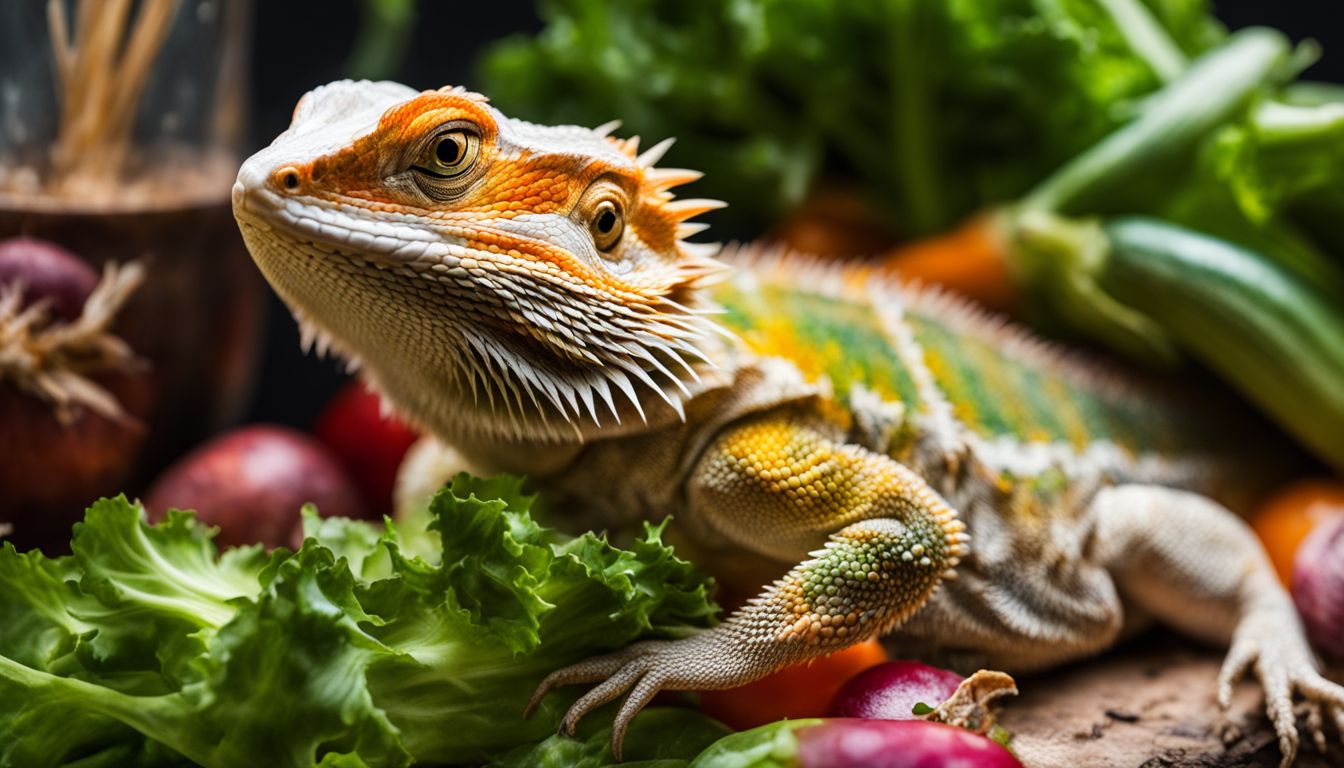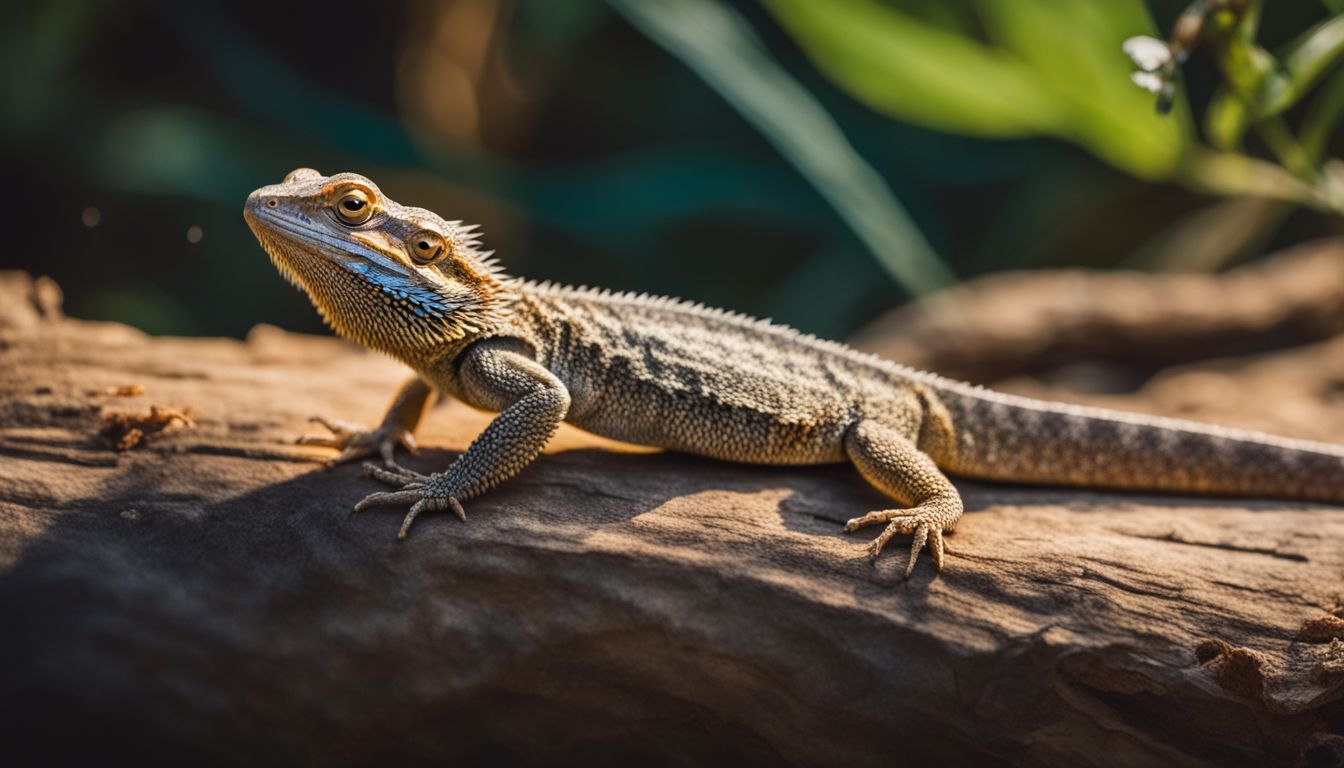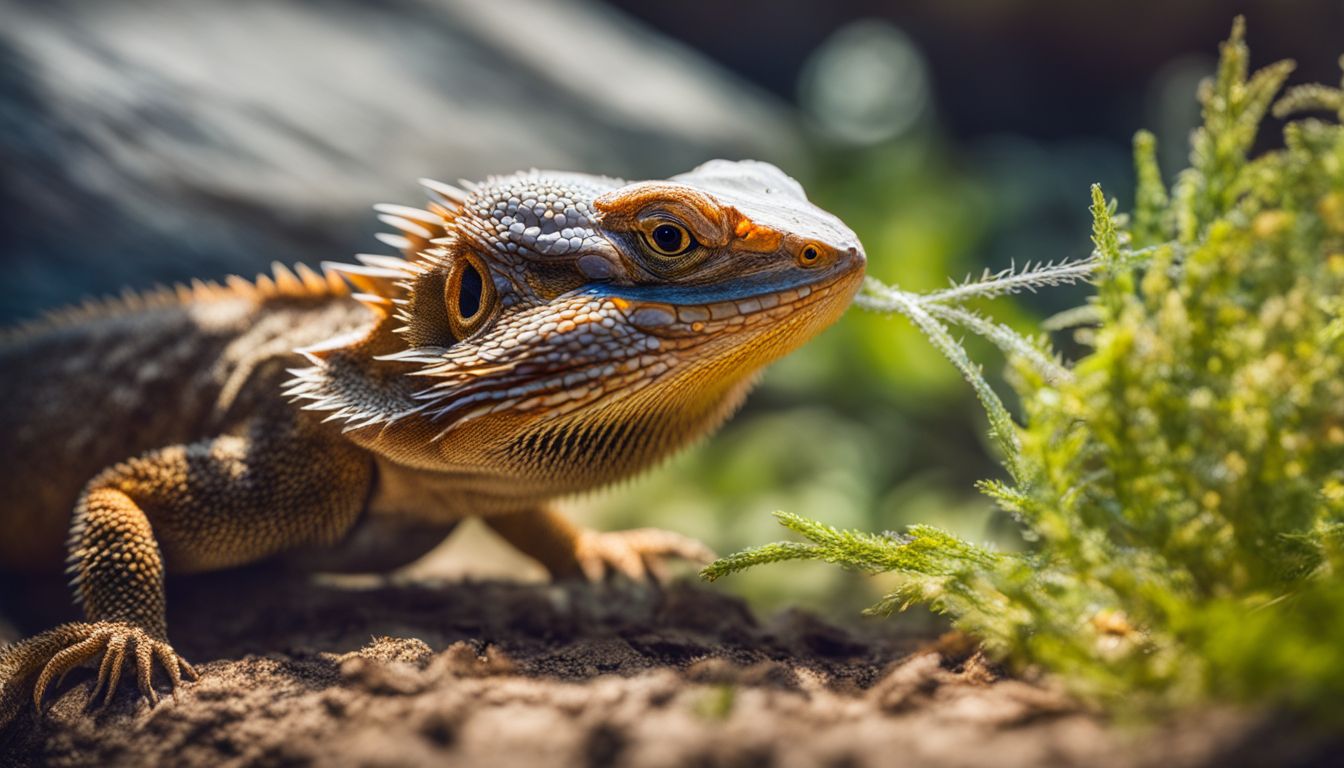Many pet owners wonder if their bearded dragons can safely munch on centipedes. Here’s a fact: Centipede venom can harm bearded dragons, causing pain and swelling. This article offers insights into the risks and safe dietary practices for your reptilian friend.
Stay informed and keep your pet healthy!
Understanding Bearded Dragons’ Diet

Bearded dragons are omnivorous creatures, meaning they enjoy a mix of insects and vegetables in their diet. This variety ensures they get a balanced nutritional intake, crucial for their health and well-being.
Foods that suit bearded dragons range from leafy greens and fruits to crickets and mealworms. However, not all foods that these reptiles might encounter in the wild or at home are good for them.
Certain items pose serious health risks and should be avoided to keep your bearded dragon healthy. It’s essential to understand what makes up a nutritious diet for bearded dragons while steering clear of dangerous foods that could harm them.
Feeding them correctly involves more than just offering any insect or vegetable you might think is safe; knowledge about each food item’s benefits and potential dangers is key.
Can Bearded Dragons Eat Centipedes?

Bearded dragons should not eat centipedes due to the risk of poisonous centipedes and potential nutritional deficiencies. Feeding centipedes to bearded dragons can lead to parasitic infections, toxic chemical exposure, venom stings, and poison consumption.
The Risk of Poisonous Centipedes
Centipedes can seem like a good snack for bearded dragons, but some are poisonous. These creatures carry toxins that can seriously harm your pet if eaten. Before you let your dragon chomp down on a centipede, know the species.
Many centipedes hold deadly poisons. They are harmful to reptiles and can cause big problems.
Feeding centipedes to bearded dragons comes with risks—poison consumption being a major one. Not all centipedes are toxic, yet it’s crucial to stay cautious. Some of them contain parasites dangerous to your reptile friend.
Remember, what might be safe for other animals could be dangerous for bearded dragons. Always consider the potential dangers insects like centipedes might pose before including them in your pet’s diet.
The Potential Nutritional Deficiencies
Centipedes might seem like an easy snack for your bearded dragon, but they can lead to serious nutritional deficiencies. These creepy crawlers are low in essential nutrients and high in fat, which isn’t good for your reptile friend.
Bearded dragons need a diet rich in calcium, vitamin A, and vitamin D3 to stay healthy. Unfortunately, centipedes don’t provide these crucial vitamins and minerals.
Feeding them centipedes could result in weight gain and leave your bearded dragon lacking the necessary nutrition for strong bones and overall health. Reptile keepers must focus on offering foods that fulfill the dietary needs of their pets, avoiding those that bring more harm than benefits.
It’s all about keeping your scaly companion happy, healthy, and well-nourished with the right insectivorous diet choices.
Risks Associated with Bearded Dragons Eating Centipedes
Bearded dragons eating centipedes can lead to parasitic infections, causing harm to their health. Additionally, exposure to toxic chemicals and venom stings from centipedes can pose significant risks for bearded dragons.
Parasitic Infection
Parasitic infections in bearded dragons are a serious concern, potentially leading to gastrointestinal issues and other health complications. Salmonella germs can lurk in their droppings, even if the reptiles seem healthy.
This poses a risk of spreading infections to both the dragons and their human caregivers. Anti-parasitic medications designed for gastrointestinal parasite infections can be crucial for treating parasitic diseases in bearded dragons, requiring proactive care and swift veterinary attention if symptoms arise.
Centipedes consumed by bearded dragons may carry dangerous foodborne pathogens that could lead to parasite infections requiring specialized treatment with anti-parasitic medication.
Toxic Chemical Exposure
Bearded dragons can be at risk of toxic chemical exposure if they consume certain species of centipedes, especially those grown in the wild. The toxicity of centipedes makes it impossible for bearded dragons to consume them unless they are grown in captivity.
Certain species of centipedes can be very toxic to bearded dragons, especially when they accidentally get stung. Bearded dragons are especially prone to being poisoned by fireflies due to their indiscriminate eating habits.
This heightened susceptibility of bearded dragons makes it vital for owners to ensure that the prey provided is free from any toxic substances and is safe for consumption by their reptile companions – Ingestion Risks in Predatory Reptiles.
Venom Sting
Centipedes are venomous creatures with sharp fangs that can harm bearded dragons if eaten. Their venom can cause pain, swelling, and even tissue damage in the dragon’s mouth or esophagus.
It’s crucial to keep centipedes away from your pet to avoid the risk of a venomous sting, which might lead to discomfort and potential health problems for your bearded dragon.
Ingesting a centipede could result in severe consequences due to their venomous nature. Be mindful of this risk and take necessary precautions to protect your bearded dragon from potential harm caused by a venom sting from these dangerous insects.
Poison Consumption
If a bearded dragon consumes a poisonous centipede, it can cause severe harm. The venom from some centipedes can lead to various reactions ranging from mild discomfort to significant pain and long-lasting effects.
Therefore, it’s crucial to seek immediate help from Poison Control or veterinary assistance if there is any suspicion of toxic ingestion by the bearded dragon.
Toxic ingestion – Bearded dragons eating centipedes may expose them to harmful substances in the form of venomous bites or poison consumption, leading to potential health risks. It’s essential for novice reptile owners to understand these dangers and take prompt action when necessary.
What to Do If a Centipede Harms a Bearded Dragon
If a centipede harms your bearded dragon, here’s what you should do:
- Immediately remove the centipede from the enclosure to prevent further harm to your pet.
- Gently clean the area of the bite with a mild antiseptic to reduce the risk of infection.
- Monitor your bearded dragon closely for any signs of distress, such as changes in behavior or appetite.
- Seek veterinary care if there are any concerning symptoms or if you are unsure about the severity of the injury.
- Take steps to prevent future encounters by carefully inspecting any insects before introducing them into your bearded dragon’s habitat.
Alternatives to Centipedes in a Bearded Dragon’s Diet
Bearded dragons can eat live mealworms, kingworms, and crickets for protein.
- Live Mealworms: Provide a good source of protein and are readily accepted by bearded dragons.
- Kingworms: Larger than mealworms, they offer a similar nutritional profile and are suitable for adult dragons.
- Crickets: High in protein, these insects are a staple in a bearded dragon’s diet and can be offered as live prey.
- Dark Leafy Greens: Offer nutrients such as calcium and vitamins, which are essential for overall health.
- Squash and Bell Peppers: Rich in vitamins and minerals, these vegetables provide variety in the diet while being easily digestible.
- Apples and Berries: Serve as occasional treats to add natural sugars and fiber to the diet.
Conclusion
In conclusion, bearded dragons should not eat centipedes due to the potential harm from their venom. Instead, offer safe insect alternatives that provide essential nutrition without posing risks.
Remember to prioritize your pet’s health by providing a well-rounded and suitable diet for their optimal well-being. Always consult with a reptile veterinarian for expert advice on the best diet choices for your bearded dragon’s unique needs.
For more information on what bearded dragons can safely eat, check out our guide on whether bearded dragons can eat edamame.
FAQs
1. Can bearded dragons eat centipedes?
Yes, bearded dragons can eat centipedes as part of their diet, but it’s important to ensure the centipedes are not toxic and have been properly sourced.
2. Are there any risks associated with feeding centipedes to bearded dragons?
Feeding wild-caught centipedes can pose risks due to potential toxins or parasites they may carry. It’s best to avoid wild-caught insects and opt for commercially bred ones.
3. How often should centipedes be included in a bearded dragon’s diet?
Centipedes should only be an occasional treat in a balanced diet for bearded dragons, rather than a primary food source.
4. What other foods can I offer my bearded dragon besides centipedes?
Bearded dragons thrive on a varied diet including insects like crickets, roaches, and mealworms, as well as leafy greens and vegetables.
5. Should I consult a veterinarian before introducing new foods into my bearded dragon’s diet?
It is advisable to consult with a reptile veterinarian before introducing new foods into your pet’s diet to ensure nutritional adequacy and safety.




